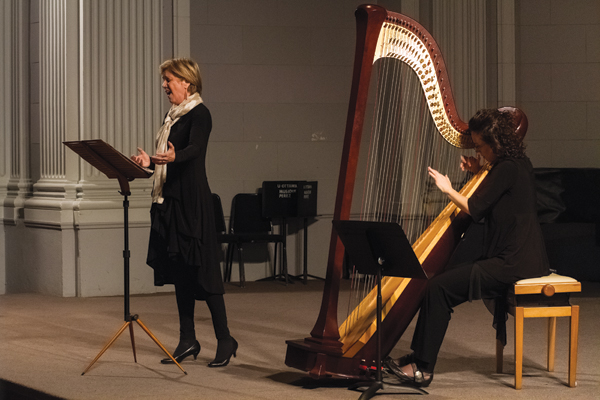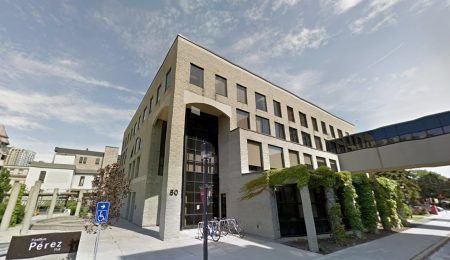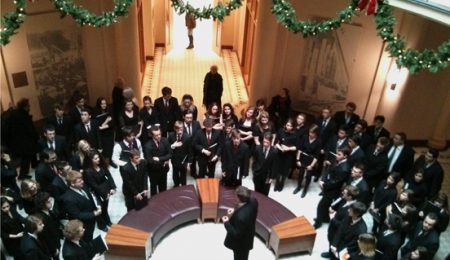School of Music floats up to Elysium, then falls back to Earth
Canadian soprano Donna Brown, a part-time voice professor at the University of Ottawa, and elegant harpist Jennifer Swartz, a professor at McGill’s Schulich School of Music, gave a concert in Tabaret Hall on Jan. 24 as a part of this year’s School of Music concert series.
The recital, titled “Music from the Elysian Fields,” recalls the listener to the Greek myth of Elysium, the final resting place of the divinely chosen heroes and poets. Pindar, an ancient Greek poet, described Elysium as shady parks where intellectuals would indulge their musical pastimes.
Brown and Swartz brought the audience to the Elysian Fields through the arrangement of well-known compositions by Britten, Caplet, Ravel, and Debussy in addition to original compositions by Brown and Roddy Ellias, for voice and harp.
Brown and Swartz established the Hellenic atmosphere with Britten’s A Hymn on Divine Muzick, with its defined cadences, flowing melismas (a group of notes sung with one syllable of text), and lyre-like accompaniment of the harp.
In Brown’s composition, Nuage, she revealed an intense vulnerability that the entrance of the harp seemed to interrupt.
Following a performance of Kaddish, the first of Ravel’s set of two Hebraic texts, Brown left the stage while Swartz played a harp transcription of Debussy’s Des pas sur la neige. Debussy’s harmonic dissonance entwined with the traditional sound of the harp creating an ethereal quality, and Swartz’s plucking of the strings seemed to weave the air into music.
Brown returned to the stage to perform Golden Muse, an original composition set to her own text, joined by the musical stylings of Swartz and Ellias. This piece starkly contrasted with the program thus far because it involved a narrator accompanied by harp. The use of choreography in addition to spoken poetry threatened to make the piece ineffective were it not for Brown’s visceral word painting and Swartz’s impeccable sense of musical accompaniment. Brown’s courage to venture into new genres was greeted with approval by the audience.
The program continued in English with four folksong settings by Britten. Brown embodied each song’s character musically and dramatically, however her connection with the audience was hindered by her dependence on the score. The highlight was Ca the Yowers, the final folksong. Brown was especially resonant; her pianos floated effortlessly, lifting the audience toward Elysium.
The final set, composed by Ellias and set to a text by Sandra Nicholls, was recently recorded by Brown in collaboration with Ellias and Swartz. Their previous work together shined brilliantly in Brown’s expressive use of word painting in Island, the second song of three. The intimacy that originated with Nuages came to climax at this moment, as though we had finally reached Elysian Fields.
Brown finished Island gazing toward the sky, however the final song of the set shattered the atmosphere of peace bringing the audience from Elysium to earth with a shocking crash. Puzzle piece incorporated catchy rhythms, finger snapping, and scat-like passages creating a jazzy conclusion. It was humorous and compositionally clever, however in contrast to the preceding program Puzzle piece, was indeed a puzzle, a UFO in the Elysian Fields. In spite of this, the audience applauded generously, which the duo aptly deserved.





